Let's Reboot... The Secret Of Monkey Island
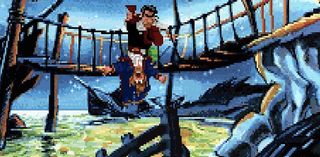
Given the things on the "To Fix" list, you've probably guessed the first part - we're pulling a Star Trek and heading back in time a little. The weird ending of Monkey Island 2 offers an easy route to that, discounting the other games as all a dream. That's disrespectful though, so instead we're going to blatantly steal from Star Trek and have a voodoo created alternate timeline. If you disapprove of stealing from Star Trek, it's okay. We're also stealing from Shrek 4. The idea is to add a certain mystery if you've played the earlier games, while also providing a new baseline for newcomers to roll with.
That baseline is that rather than being the naive pirate from The Secret of Monkey Island, we now meet Guybrush in his more blowhard form from Monkey Island 2. Complete with the beard. He's a self-proclaimed pirate without a ship, which nobody fails to notice, mostly surviving by telling tall tales around the Caribbean until everyone gets bored and he moves on. A drifter rather than a pirate.
Nobody actually believes him though, and not without cause. He seems utterly convinced that he destroyed the Ghost Pirate LeChuck, saved Governor Elaine Marley and charted a ship to the mythical Monkey Island... all exactly as we know happened, but can't have. Elaine only vaguely remembers him as a bumbling pirate she once spared out of pity. Nobody's even heard of this "Monkey Island" he's so proud of having sailed to. Finally, his epic boasts of taking down the Caribbean's greatest monster using only his wits and a handy bottle of ghost busting rootbeer go down as well as you'd expect.
Not least because the Ghost Pirate LeChuck is still very much haunting the seven seas.
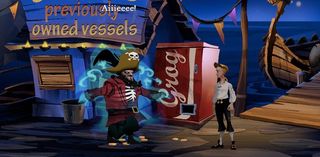
The Reboot of Monkey Island, as it were, needs to master three trials of its own - to allow for wit, to enable comedy, and unlike previous games, to actually feel piratey. That means that while the original games were entirely cerebral games, there'll now be an action element that- No! Wait. Don't panic. Look, Full Throttle and Quest For Glory got away with adding extra elements, and even The Secret Of Monkey Island stretched itself out a little by making Monkey Island itself more RPG in style than Melee.
For our purposes, 'action' doesn't mean button mashing or reflex tests - at least not on the critical path, though there's some scope for harder challenges around the edges, as we'll get to. Think more Sid Meier's Pirates than Tomb Raider - an injection of new game mechanics to freshen things up and provide the piracy experience that the originals never really did, but for the benefit of comedy and story.
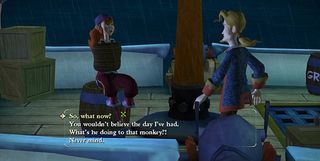
Take conversations as an example. The old methodical dialogue tree system has had its day and is getting put out to pasture. Sorry, but it's time. It worked better in the days before spoken dialogue. Our Monkey Island reboot instead uses a system more like Alpha Protocol/The Walking Dead, where choices have to be made on the hop. Where those games use it to fill conversations with dilemmas and big decisions though, this is in service of another master - allowing for dialogue and banter that actually has proper comedy timing for once. Look at Portal 2 to see how important that is.
The biggest gaming news, reviews and hardware deals
Keep up to date with the most important stories and the best deals, as picked by the PC Gamer team.
(CLARIFICATION EDIT: Think 'reflowing the conversation stream' here.)
Not every conversation would go like that, of course - that would be overkill. The important ones would though, with Guybrush automatically picking a funny option if the player doesn't. Others would simply be click/response jobs, with quick gags, reminders and push-offs, and Guybrush smart enough to hand over any necessary objects/information without the need for a lengthy wind-up chat every time.
The same system can also be used for combat, in an evolution of insult swordfighting. Instead of dueling barbs, the focus is now on wit mixed with choreographed awesomeness. Basically, this:
The main catch isn't so much challenge as the torture of repeated jokes, so fail states would be kept at an absolute minimum or shrugged off. In a sea battle for instance, maybe you'd lose half your gold, adding a gambling system that makes you cash in when you can afford the next tchotchke or plot coupon. In a sword-fight, an arrogant opponent might play things straight for two rounds, but then just start going "Blah blah blah" and throw the fight out of boredom. There are always ways to play things. After all, it's not like you couldn't die in Monkey Island and Monkey Island 2 ...
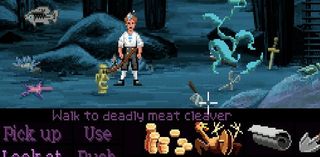
This sense of pace and purpose runs through the whole reboot, doubling down on what makes Monkey Island a unique setting rather than simply a quirky world. In the original game for instance, Guybrush wanted to be a pirate for no particular reason, and that was fine. This time though, he has a more personal stake in earning respect and getting what he wants. His life depends on it.
Either enraged by stories of this pirate claiming to have defeated him, or having some lingering hate from the other timeline, our newly restored Ghost Pirate LeChuck begins the game wanting Guybrush dead. This isn't too much of a break from the original two games, where he was a threatening figure seen from afar. Now though, he takes more of a personal interest. Where Guybrush goes, destruction soon follows - and this isn't a LeChuck played for comic effect. Instead, this is LeChuck before the sting of defeat, at the height of his power. Think Brian Blessed, burning whole islands into ash on a whim, and really held back only by delusions of civility - especially in front of Elaine - and having an enslaved army that really isn't that bothered about evil, and only jumps to attention when he's on their backs.
Of course, things wouldn't be that serious. We're talking about a guy called "LeChuck" here. The gag is simply shifted from "LeChuck is an incompetent failure" to other comedy avenues - how characters react to his hammy bombast for instance, or situations where he's forced out of his comfort zone. A dinner party at Elaine's mansion, maybe, where he's unconvincingly faking being alive and charming for her with the help of someone else's ill-fitting skin around his ghostly blue form, with Guybrush completely oblivious to how close he is to being throttled until his head pops off like a champagne cork.
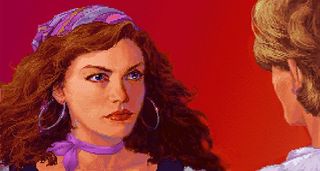
Speaking of Elaine, this rebooted version of her is also little different. She's still Governor, though of a new island rather than re-using Melee or Plunder or Booty - at this point, she's been in charge of half the Caribbean at some point, so one more island hardly matters. This is where Guybrush washes up after an initial attack by LeChuck, hoping to prove his stories true, only to find that she's not willing to help.
Like LeChuck though, something persists. She's not in love with Guybrush, but she does find herself oddly tolerant of him - even as his every act causes her trouble, embarrassment, or just plain gets in her way. Her new island is a Tortuga type port with a heavy pirate presence that she keeps order over by being extremely good at what she does. As Guybrush soon finds though when he agrees to defeat a mysterious ship that's been preying on the lily-livered locals, she's got her swashbuckling side too. If only because how else would you get an island full of pirates to pay their damn taxes?
I imagine her having a very nice ship, of course. Should, y'know, someone have to 'borrow' it for an odyssey around several quirky, conveniently flammable islands, with both a fleet of the damned and its original owner in hot pursuit. Hypothetically, of course. Purely hypothetically...
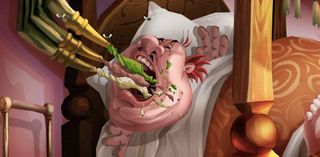
Going darker in tone doesn't mean a less comic game. As I've discussed elsewhere , one of the great benefits of a seemingly sinister world is that the lighter moments shine all the brighter - Largo's defeat in Monkey Island 2 for example, where the game spends a big chunk of time building him up as a viable threat to Guybrush, only to repeatedly humiliate him. That's the kind of baseline here we're dealing with here - a world where a pirate bar should look like a scary place, undercut by the residents, and villains have dignity to be stripped away by Guybrush's luck and cleverness.
Why is that important? If you chart comedy on a graph - because that's hilarious, amiright? - most games would look like three different types - a series of peaks and troughs, a jagged line that looks like Elmer Fudd having an orgasm into an oscilloscope, and the flat line of failure. The second is what most games have gone for - yuk, yuk, yurk. If a gag doesn't work, no matter. There'll be another along in a second. The catch is that a game doing that soon establishes a level that players can get accustomed to - a little like how horror games' jumpscares are more effective at the start.
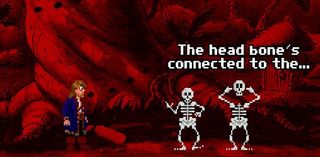
Instead, our reboot will aim for peaks and accept troughs in the aim of getting the peaks as high as possible - boosted of course by gags, surreal objects, background detail and so on to keep a general level of good humour going throughout. This allows for drama and genuine menace, which can be defused in funny ways - a comedy technique called 'bathos' - as well as exciting set-pieces that don't necessarily need a punchline. Tales of Monkey Island for instance featured a long sequence of Guybrush very painfully getting the shit kicked out of him by LeChuck, while the extended gag about his torture machine in Monkey Island 2 didn't diminish the fact that Guybrush was in genuine danger. In context, anyway, even if in reality the worst that could happen was a fake-out.
One of the best things about Monkey Island as a setting - the series, not the island - is that it offers great scope for a journey, where every island can have its own unique theme. Like the first two games, our reboot starts on a murky one with lots of bullies and casual cruelty opportunities to set tone. The main characters' comedy moments would primarily be based around situational gags and wit and being the straight-men to and instigators of slapstick rather than explicit clowns.
That's why the design gods invented secondary characters...
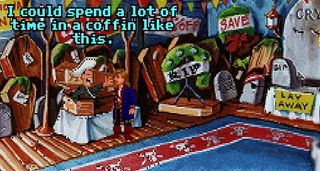
Well, obviously Stan has to return. Three words: Previously Owned Tattoos.
Coupled of course with some brand new mechanics...
Most Popular







